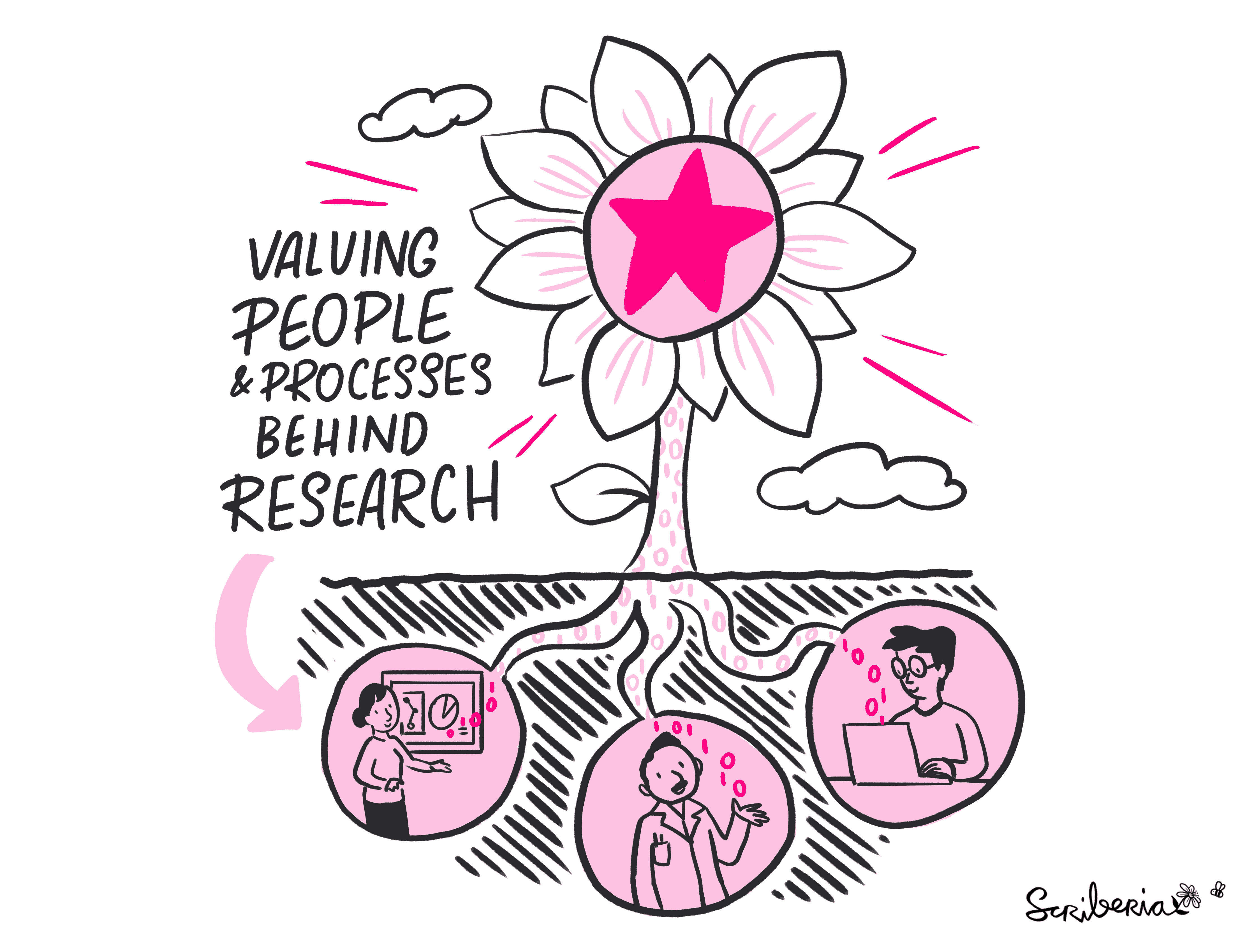As a community-led project, we believe in and promote a collaborative approach to develop the content of this book. For example, writing a The Turing Way chapter is an iterative process that involves designing, outlining, writing, reviewing, and editing its contents. Similarly, community-oriented processes evolve over time with the help and feedback from the community members.

Figure 1:The Turing Way project illustration by Scriberia. Used under a CC-BY 4.0 licence. DOI: The Turing Way Community & Scriberia (2024).
Community members, contributors and co-authors¶
Everyone who contributes to this book, no matter how small or big their contributions are, is recognised in this project as a contributor and a community member.
Their contributions may include carrying out small tasks such as reporting bugs, correcting factual errors, adding references, opening issues to discuss an idea, commenting on an ongoing discussion, exchanging ideas with other members or citing and promoting The Turing Way. As discussed in the next subchapter, these contributors are highlighted in the Contributors Table.
Many contributors will also make substantial contributions such as writing a subchapter, maintaining community interactions, setting up or maintaining the project’s infrastructure, helping others in their work and supporting their participation. All the substantial contributors are also highlighted in the Contributors Table and named as co-authors [def] on the book as a whole. As stated in our Governance document, “substantial contribution” is a subjective term. Therefore, we have tried to add as much detail as possible in the next subchapters through personas, contribution types and acknowledgements of those contributions including when a contributor is named as an author.
Authors are listed in alphabetical order by last name. The first author is always The Turing Way Community.
Authorship is cumulative. If you have been added as an author on one release, you will stay as an author on all future releases.
If these subchapters do not contain the contribution type that you are interested in or if you would like to know whether you are eligible to be named as an author, please contact the core team by emailing theturingway@gmail
Creating opportunities for shared ownership¶
As an open-source community, the project invites contributions from experts and enthusiasts alike to collectively develop guidance, recommendations, and practical resources that can foster a gold-standard for reproducible research.
The Turing Way core team values and promotes a culture of collaboration. In contrast to the traditional incentive structure in academia, which often discourages open collaboration, public engagements in project advancement and sharing data early on, we promote a collaborative working culture in The Turing Way.
We intentionally avoid individual authorship in favor of establishing shared ownership and agency in this project. This means that no single person or organisation owns the book or any of its chapters. The book belongs to the community and the chapters are always considered ‘work in progress’ so that they can evolve over time with newer contributions. We encourage authors to actively involve others in reviewing their work, providing missing information and adding diverse examples, which could not possibly be written by a single person.
We hope that such collaborative efforts lower the psychological barriers for the new contributors who can propose improvements in the book by editing, moving, and adapting its content as the book grows.
Furthermore, with our commitment to fair acknowledgement in this project, we create opportunities to highlight the work of every contributor without trying to fit The Turing Way into a traditional credit system.
This is also an opportunity for us to promote a cultural change in the research assessment system to better recognise an individual’s contributions to open science. These contributions include exchanging skills, sharing research components for reuse, and offering other academic services such as leading collaborative efforts, organising events, offering consulting, maintaining community resources, teaching and mentoring for the benefit of the broader scientific community.
Highlight your contributions!¶
In the next subchapter, we have listed all the documents in this project that are considered the “Record of Contributions”.
We want our community members to take pride in the valuable work they have done on this project. We invite them to edit these documents to add details of their contributions that they want to highlight in The Turing Way.
We welcome your suggestions and ideas for creating more ways to acknowledge you.
- The Turing Way Community, & Scriberia. (2024). Illustrations from The Turing Way: Shared under CC-BY 4.0 for reuse. Zenodo. 10.5281/ZENODO.3332807